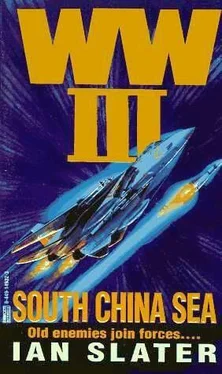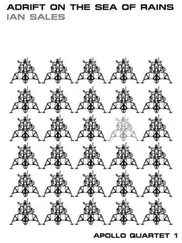Vinh introduced Freeman to a group of five Vietnamese guides before he shook hands with Freeman and stepped into a Long March staff car to take him back to Hanoi, from whence he’d rejoin the battle on the western front.
In one of the strangest verbal exchanges in his career, General Freeman was engaged in a whispered “shouting” match with Marte Price of the Des Moines Register. “General, give me one good reason for me not going — a reason you can give that CNN cameraman and that CNN reporter.”
“Ms. Price, I don’t have to give reasons to the press. You stay with the trucks. You should have gone back with Vinh, goddamn it! I’ll have you disbarred from the press pool.”
“There is no pool, General.”
“Goddamn it, you could get shot!”
“I know the risks.”
“You certainly do not.”
“General, when you said, ‘Stay by the headquarters group,’ I assumed that was all the way up to the front.”
“Well, you assumed wrong, goddamn it.”
“Give me one good reason, General, and I’ll stay behind.”
“You’re a woman, goddamn it!”
“You’ve used women chopper pilots before, and I wish you wouldn’t keep saying that.”
“Well, you are a woman — aren’t you?”
“I mean saying ‘damn it’ all the time.”
“All right,” Freeman said. Major Robert Cline thought the general was about to give in, but Freeman took a breath and said, “You smell!”
“I what?’
“The Vietnamese guides,” he said, nodding in their direction, “have complained that you’re a hazard to the operation, and I agree. They told me they could smell your perfume before the first truck rounded that curve a hundred yards back. Chinese regulars’d sniff us coming from a hundred yards away.”
For a moment Marte Price was lost for words, but then suddenly she knew she had a counterattack. “General, I can smell cigarette smoke, and none of your troops are smoking now. Ever walk into a motel room where there’s been a smoker? You can smell it right away.”
“I’m not in the habit of going to motels,” he replied grumpily. But she had him and he knew it. Despite all their instructions in training Special Forces like the Delta Force and SAS about not using deodorant and so on, a smoker carried the stale smell of cigarette or cigar smoke wherever he went.
“All right,” Freeman said, more fiercely than before, and in an uncharacteristic non sequitur that would become part of Second Army lore, he added, “Don’t blame me if you get killed! Goddamn it!”
“I won’t,” she said quietly, smiling, her features more distinct now as the predawn light stole upon the clearing in the black jungle by the road.
“I’ll rub mud in my armpits,” she said.
As Freeman turned to walk over to the Vietnamese guides, he confided to Major Cline, “By God, I hope the Chinese aren’t as tough as her. We’ll get our clock stopped.”
“PLA use women in combat, General.”
“We’re not the PLA. We’re Americans.”
“With some Brits and Aussies to come, plus the British Gurkhas—”
“Yes, yes, I know — we’re a United Nations force.”
According to lore, it was similar to what George Patton had said, Cline thought, when he complained about Eisenhower being an ally and not an American. The general liked everything his own way, and after Freeman’s spirited exchange with Marte Price, Cline had a sneaking suspicion that his intent to carry out a recon in force and return within four days was being done not just to better deploy Second Army, now arriving in Hanoi, but for some other reason, which no one, including the Pentagon, knew about. “Letting her come along with us, General, will win you a lot of kudos back home — and ‘round the world via CNN.”
“I’m not interested in kudos from the femisphere, Major. Far as I’m concerned, those rampant feminists—”
“I meant from the Pentagon, General. There’s been a big push for equal rights.”
“Damn it, Bob, the army’s not a democracy. Even the Chinese know that. After years of that comrade crap, they’ve now reinstituted rank—’different pay scales.’ “
“Maybe so, General, but my guess is having a woman reporter at the front’ll do you more good than harm back home.”
Freeman turned to Cline. “You make it sound like I’m running for office.”
“General Eisenhower did.”
“I’m not a political animal.”
“Maybe not, General, but I still say your decision to have Marte Price will raise your profile — promotionwise.”
“I didn’t decide. She did.”
“Even if she did, I don’t think you’ll regret it. It’s politically correct.”
“I don’t give a dog’s turd about political correctness and you know it.”
Cline knew it, but the general had an ego as big as an M-1 tank, and it enjoyed being refueled every now and then with a headline or a TV sound bite that would keep the legend alive.
The general pulled down his IR goggles to take another look at the topographic map between Bac Ninh and Lang Son near the Vietnamese-Chinese border, about thirty miles of it across part of the lush Red River delta and then into the hilly jungle country of the border range. First he’d send out one patrol along the sides of the road for five miles. There was no point “hoofing” it, as he put it, if he could use the trucks for another few miles or so. He was confirmed in this tactical decision after one of the Vietnamese guides got off the radio with Hanoi to say it had been reported that Chinese units were pulling back from the delta ten miles or so up the road toward Kep, only nine miles from Lang Son.
Freeman’s smile was a wry one, the kind he used when a colleague played chess with him and thought he’d baited a trap. Besides, part of the Freeman legend was “speed.”
“Well, I’ll tell you one thing, Bob. We’re going slowly up that road in cloverleaf. If the Chinese have pulled back that quickly, then it’s for one of two reasons. It’s because their attack into Vietnam has been so successful that they’ve outrun their supply line, or it’s a trap.”
“Think we should stay put awhile, General?”
“No, you don’t win wars by sitting on your butt. Either way, we’ll have to find out what’s going on. The thing is to be ready for whatever happens. But before we do send out a patrol, I want our flyboys in that Enterprise battle group to be ready for some TACAIR if we need it. We’re not going to get arty,” he meant artillery, “for a few days, until the self-propelled guns can get up here from Hanoi.”
“General!” Cline said in amazement.
“What? What’s wrong?”
“Nothing. That Marte Price woman undid her blouse and stuck some dirt under her arm.”
“For Chrissake,” Freeman said.
Aboard the Chinese frigate there was a rising sense of panic. The lookout had seen the wake of the American torpedo through his binoculars and given the captain a three-minute warning. With the torpedo coming midships, the frigate quickly began a standard “shake off’ procedure, turning hard astarboard to run parallel with the torpedo’s wake and then, as the latter changed direction, hard astarboard again. Next the captain ordered a fan pattern of depth charges off the stern’s starboard side.
The turbulence of the resulting semicircle of explosions bothered the torpedo’s advanced seeker head’s computer, but only for a second or two. And then, like a hound suddenly recovering the scent, the Mark 48 locked onto its prey. As the frigate made its last attempt to run parallel, its helicopter lifted off from the stem pad only seconds before the Santa Fe’s torpedo exploded starboard midships, lifting the bow high and dumping it, the ship’s back broken, fire already raging about the stern, orange-black flames leaping wildly, the sea about the stricken ship literally boiling white from the intense heat of the explosions and fires.
Читать дальше












